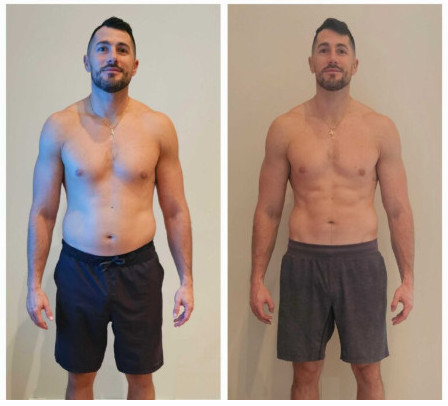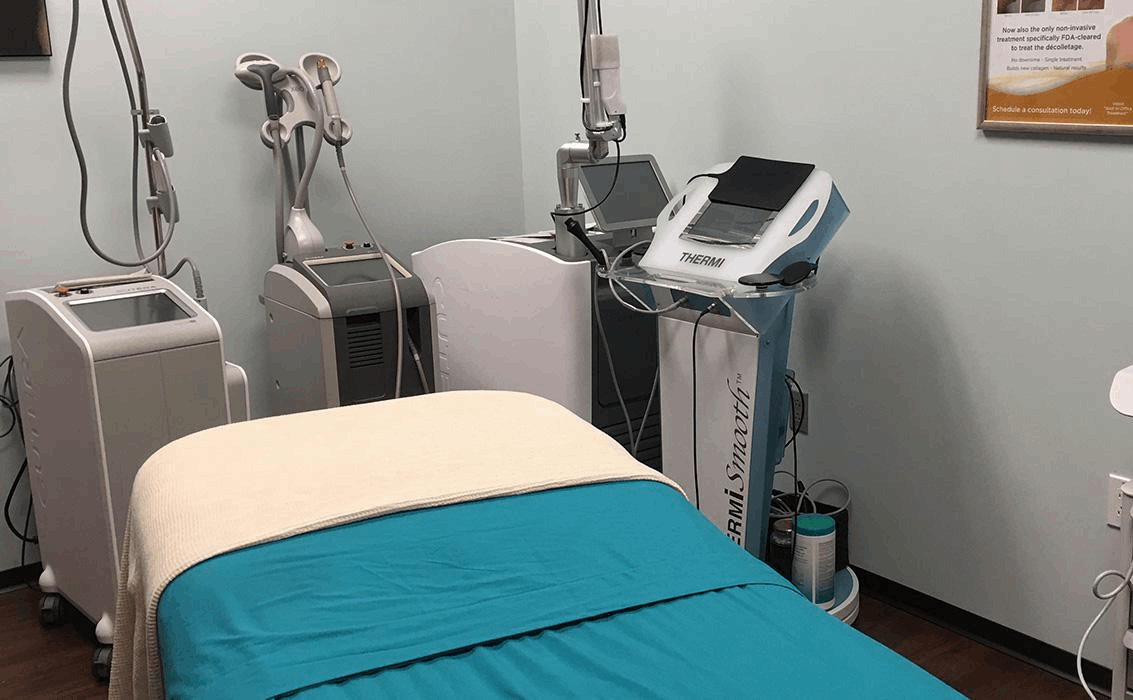Introduction
Testosterone therapy has become a vital solution for those facing the challenges of low hormone levels, especially when it comes to managing weight. This treatment not only seeks to restore hormonal balance but also brings a host of benefits that can greatly influence body composition and overall well-being. However, we understand that navigating the complexities of weight changes during therapy can feel overwhelming. What strategies can you use to embrace the advantages of testosterone while minimizing unwanted weight gain?
Together, we can explore effective approaches that empower you on your wellness journey. By acknowledging your concerns and providing supportive guidance, we aim to help you harness the full potential of testosterone therapy.
Understand Testosterone Therapy and Its Impact on Weight
Are you struggling with low hormone levels? This treatment is designed to restore hormone levels in individuals diagnosed with hypogonadism, a condition characterized by low hormone production. This hormone is vital for many bodily functions, particularly in regulating fat distribution, muscle mass, and metabolism, which can influence testosterone to gain weight.
At Woodlands Wellness & Cosmetic Center in The Woodlands, TX, we understand your concerns and offer expert hormone health solutions tailored to your unique needs. Our personalized hormone replacement therapy promotes optimal wellness, helping you regain balance and vitality. By optimizing hormone levels, many experience a significant increase in lean muscle mass, which can enhance metabolic rate and facilitate fat loss, especially when they use testosterone to gain weight.
Research shows that hormone treatment can lead to a noticeable decrease in waist circumference and fat mass. In fact, studies have demonstrated an average reduction of 0.402 cm in waist measurement and a decline in triglycerides by 0.243 mM after intervention. Furthermore, this hormone plays a crucial role in appetite regulation and energy levels, making it easier for you to maintain an active lifestyle.
For instance, a controlled study involving hypogonadal men revealed that those undergoing hormone treatment experienced sustained loss of mass and improved body composition over time. Prolonged hormonal treatment, including the use of testosterone to gain weight, has been linked to substantial decreases in mass, waist size, and BMI, reinforcing its effectiveness as a strategy for managing obesity.
Endocrinologists emphasize the importance of testosterone to gain weight in preserving muscle mass, which is associated with enhanced calorie burning and better metabolic health. As one expert noted, ‘Testosterone to gain weight helps maintain muscle mass, increase the number of calories you burn, and may keep you motivated to stay physically active.’ This highlights the diverse advantages of hormone treatment, especially for those facing challenges with body mass management.
Understanding these effects is crucial for anyone considering or currently undergoing testosterone treatment, as it lays the groundwork for effective management strategies. Together, we can navigate this journey towards better health. To learn more about our comprehensive treatments, including thyroid health services, and to schedule a consultation, please reach out to us at Woodlands Wellness & Cosmetic Center.
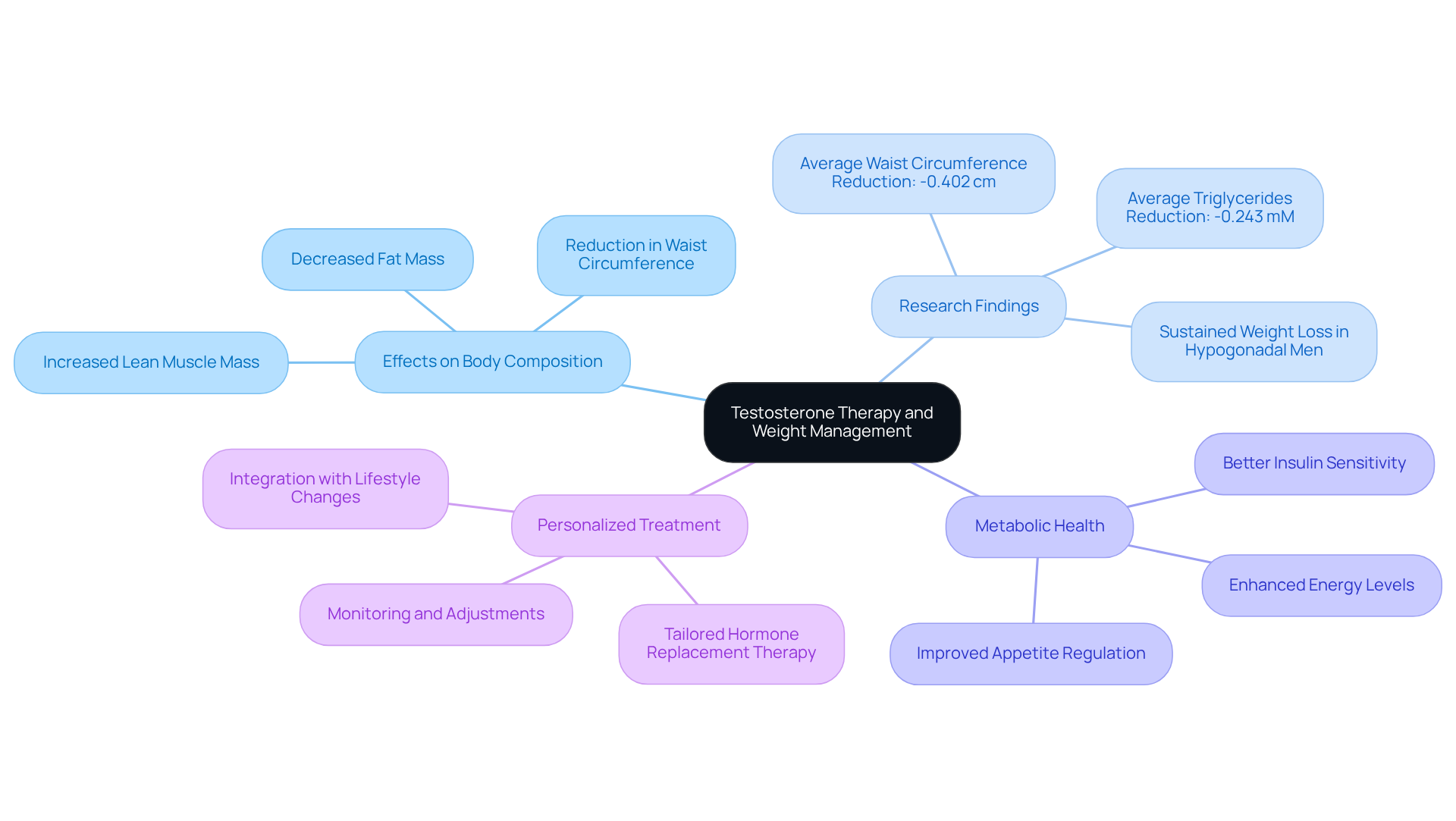
Identify Causes of Weight Gain During Testosterone Therapy
Testosterone therapy can be a journey filled with ups and downs, and while many experience weight loss, some may use testosterone to gain weight. Understanding the reasons behind this can help you navigate your path more effectively.
-
Fluid Retention: In the early stages of treatment, it’s common to experience short-term water retention. This can lead to a temporary increase in body mass, often accompanied by feelings of bloating. It’s a natural response to hormonal changes, and knowing this can ease some concerns.
-
Increased Appetite: Have you noticed a rise in your hunger? Testosterone can stimulate appetite, which might lead to higher caloric intake if not monitored. This increase in appetite can contribute to gradual weight gain, particularly when individuals use testosterone to gain weight while keeping their eating habits unchanged. Being mindful of your meals can make a significant difference.
-
Muscle Gain: One of the positive aspects of testosterone treatment is the encouragement of lean muscle growth. While this can result in an increase in mass, it’s important to remember that muscle is denser than fat. This means that even if the scale goes up, your body composition may be improving, which is a beneficial outcome.
-
Hormonal Imbalances: It’s also essential to consider how variations in other hormones, like estrogen, can impact body mass during treatment. Conditions such as insulin resistance or hypothyroidism may complicate your efforts to manage weight. Understanding these factors is crucial for your overall wellness.
By comprehending these elements, you can take charge of your body mass during hormone treatment. Regular discussions with healthcare professionals can provide valuable insights, and tracking your body composition rather than just weight can help you see the bigger picture. Together, we can monitor fat loss and muscle gain more accurately, ensuring you’re on the right track in your wellness journey.
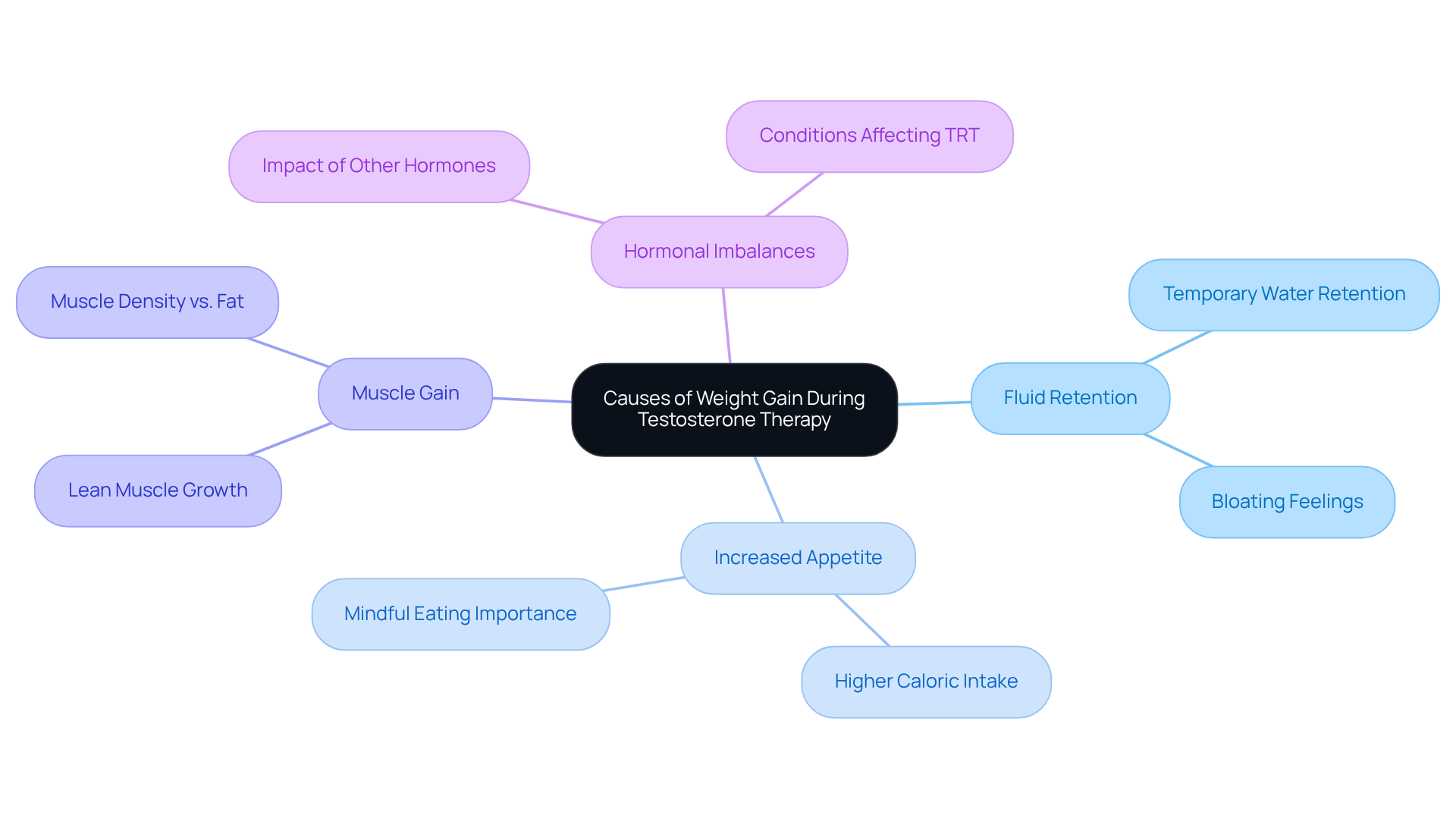
Implement Strategies to Manage Weight Effectively
Managing weight during testosterone therapy can feel challenging, but understanding how to use testosterone to gain weight can help you navigate this journey effectively.
-
Balanced Diet: Start by focusing on a diet that includes lean proteins, healthy fats, and whole grains. Monitoring your caloric intake is essential, particularly if you are using testosterone to gain weight, to prevent excessive weight gain. A balanced diet not only supports muscle growth but also aids in fat loss. Research shows that those undergoing hormone treatment who prioritize nutrient-rich foods often achieve better management results.
-
Regular Exercise: Incorporating both strength training and cardiovascular exercises into your routine is essential. Strength training helps build muscle, which boosts metabolism, while cardio workouts are great for burning calories. Studies indicate that individuals who consistently engage in strength training during hormone treatment, particularly with testosterone to gain weight, can see significant improvements in body composition, including increased muscle mass and reduced fat percentage. In fact, a 2020 study found that men receiving hormone replacement therapy with testosterone to gain weight experienced an average weight loss of 20% over more than 11 years.
-
Hydration: Staying well-hydrated is vital for managing fluid retention and supporting your overall health. Proper hydration can help mitigate temporary changes in body mass often associated with hormone treatment. To manage water retention, consider drinking plenty of water, limiting sodium intake, and incorporating cardiovascular exercise into your routine.
-
Sleep and Stress Management: Prioritizing quality sleep and managing stress through relaxation techniques can make a significant difference. Both factors play a crucial role in maintaining hormonal balance and overall well-being. Adequate sleep is linked to better management outcomes, while low hormone levels can lead to fatigue, increasing cravings for high-fat and sugary foods. This makes stress management all the more important.
-
Regular Monitoring: Keeping track of your weight and body composition is key to spotting any changes early on. Regular evaluations, such as composition analysis, can provide valuable insights into your well-being during hormonal treatment, especially in understanding how testosterone to gain weight may necessitate timely adjustments to your nutrition and fitness plans. Open communication with your healthcare provider about any changes in body mass during hormone treatment is essential for effective management.
By focusing on these strategies, you can enhance the benefits of hormone treatment while working towards your weight management goals. Remember, you’re not alone on this journey; together, we can achieve your wellness objectives.
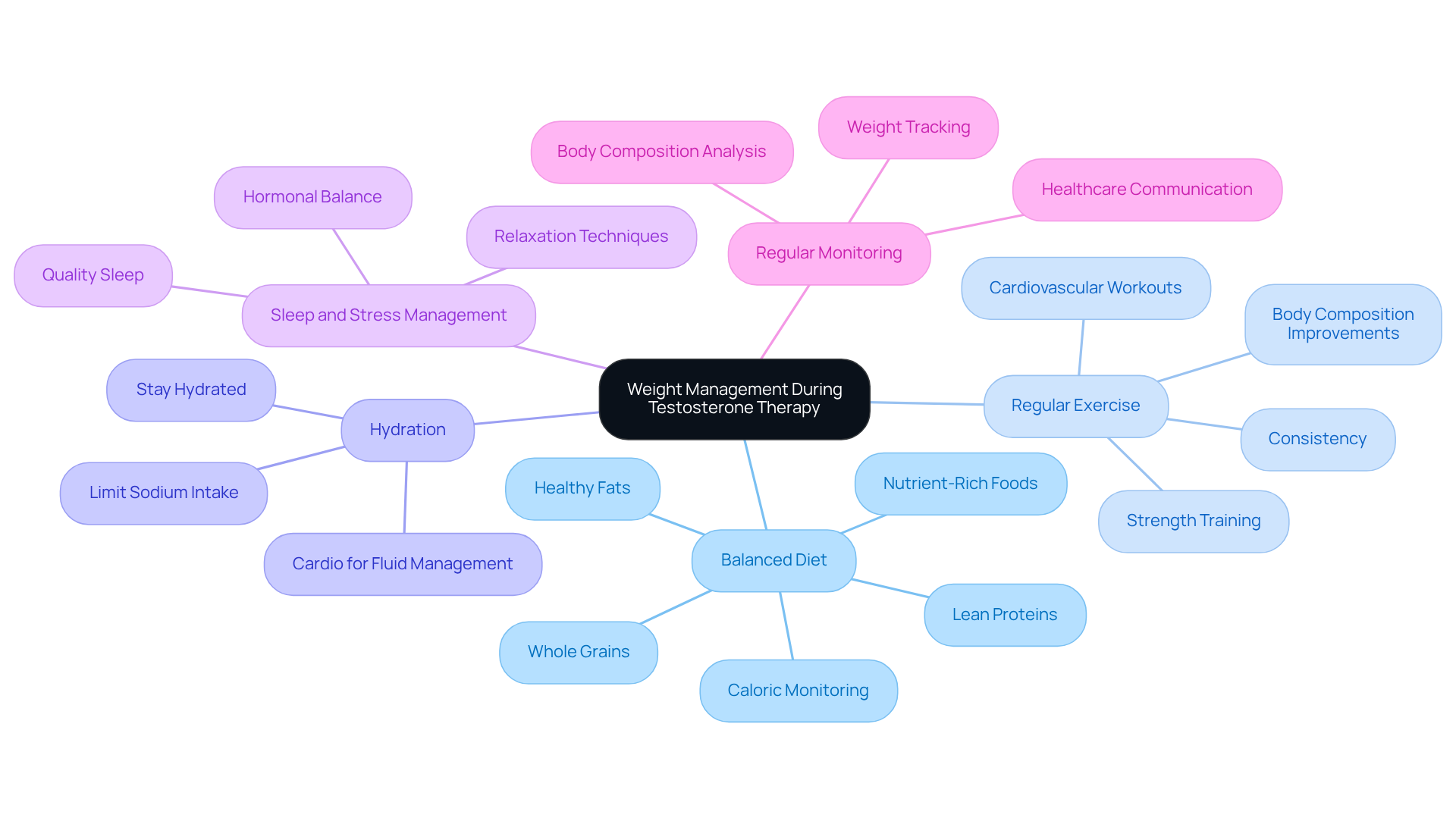
Monitor Progress and Adjust Lifestyle Factors
Tracking your progress during hormone treatment is crucial for managing your body effectively. We understand that this journey can be challenging, but by following these steps, you can take control of your health and well-being.
-
Regular Check-Ins: Schedule consistent appointments with your healthcare provider to evaluate your testosterone levels and overall health. Regular health check-ups are vital, as they allow for timely adjustments to your treatment plan based on your unique needs. Remember, you’re not alone in this; your healthcare team is here to support you.
-
Track Measurements: Keep a comprehensive log of your mass, measurements, and composition. This practice helps identify trends over time, enabling you to distinguish between temporary fluctuations and significant changes. Research shows that individuals who successfully track their mass can attain improved health results. Additionally, maintaining diet and exercise records can assist in identifying patterns affecting body weight variations during hormone treatment.
-
Adjust Diet and Exercise: Be prepared to modify your diet and exercise regimen based on your progress. If you notice an increase in mass, consider reducing caloric intake or increasing physical activity. Participating in consistent physical exercise, especially resistance training, is crucial for enhancing the advantages of hormone treatment. Healthcare experts suggest that lifestyle changes, such as loss of mass and exercise, are essential elements in managing testosterone to gain weight. Together, we can find the right balance for you.
-
Listen to Your Body: Pay close attention to how your body reacts to treatment and lifestyle changes. Notable changes in energy levels, mood, or body mass should trigger a conversation with your healthcare provider to ensure your treatment plan stays effective. Open communication is key; don’t hesitate to share any changes you encounter during treatment. Initial fluctuations in mass during hormone treatment may happen due to water retention, so it’s important to manage expectations.
By following these steps, you can effectively manage your weight and enhance the benefits of using testosterone to gain weight. Remember, this journey is about improving your overall health and well-being, and we’re here to support you every step of the way.
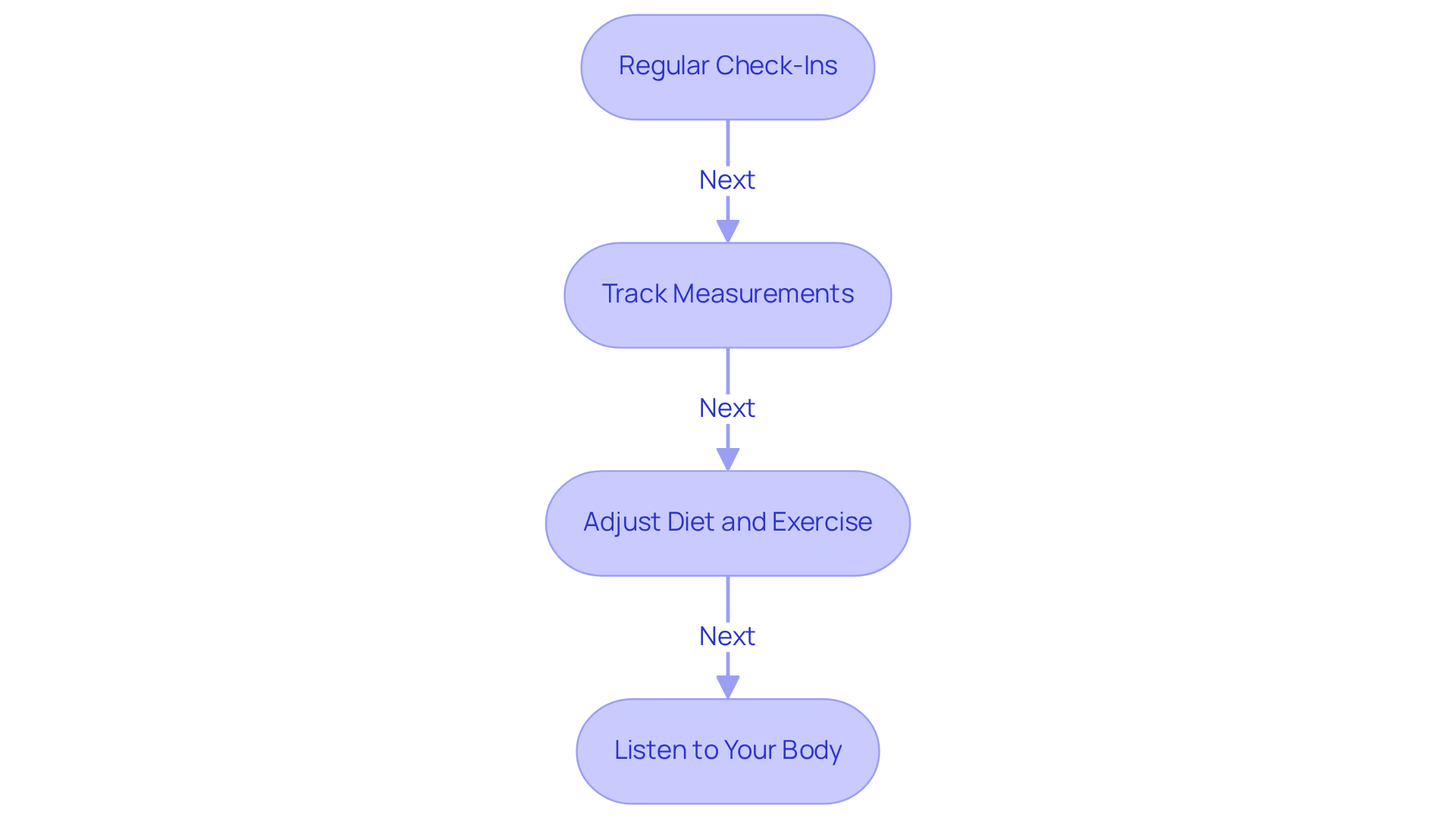
Conclusion
Understanding the relationship between testosterone therapy and weight management is crucial for anyone looking to enhance their health. This treatment can help restore hormone levels, which may lead to better metabolic rates, increased muscle mass, and improved fat loss. However, it’s important to recognize that some individuals might experience weight gain during therapy due to factors like fluid retention, increased appetite, and hormonal imbalances.
To effectively manage weight while undergoing testosterone therapy, consider these key strategies:
- Maintain a balanced diet rich in nutrients
- Engage in regular exercise
- Stay hydrated
- Prioritize sleep and stress management
- Consistently monitor your progress
By adopting these approaches, you can navigate the challenges of weight management during treatment and work towards your wellness goals.
Ultimately, this journey is about more than just the numbers on a scale; it’s about fostering a healthier lifestyle and enhancing your overall well-being. We encourage you to connect with healthcare professionals for personalized guidance and support throughout your testosterone therapy. Taking proactive steps today can lead to lasting health benefits and a more balanced life tomorrow.
Frequently Asked Questions
What is testosterone therapy and who is it for?
Testosterone therapy is a treatment designed to restore hormone levels in individuals diagnosed with hypogonadism, a condition characterized by low hormone production.
How does testosterone affect weight and metabolism?
Testosterone plays a vital role in regulating fat distribution, muscle mass, and metabolism, which can influence weight gain and fat loss.
What benefits can individuals expect from testosterone therapy?
Individuals may experience a significant increase in lean muscle mass, enhanced metabolic rate, and improved fat loss, along with better appetite regulation and energy levels.
What does research say about the effects of hormone treatment on body measurements?
Research indicates that hormone treatment can lead to a noticeable decrease in waist circumference and fat mass, with studies showing an average reduction of 0.402 cm in waist measurement and a decline in triglycerides by 0.243 mM after intervention.
What were the findings of studies involving hypogonadal men undergoing hormone treatment?
Controlled studies revealed that hypogonadal men receiving hormone treatment experienced sustained loss of mass and improved body composition over time, including substantial decreases in mass, waist size, and BMI.
Why is preserving muscle mass important in weight management?
Preserving muscle mass is important because it is associated with enhanced calorie burning and better metabolic health, which can aid in weight management.
How can testosterone therapy motivate individuals to stay active?
Testosterone therapy helps maintain muscle mass, which can increase the number of calories burned and may keep individuals motivated to stay physically active.
Where can individuals learn more about testosterone therapy and related services?
Individuals can learn more about comprehensive treatments, including thyroid health services, and schedule a consultation at Woodlands Wellness & Cosmetic Center.



